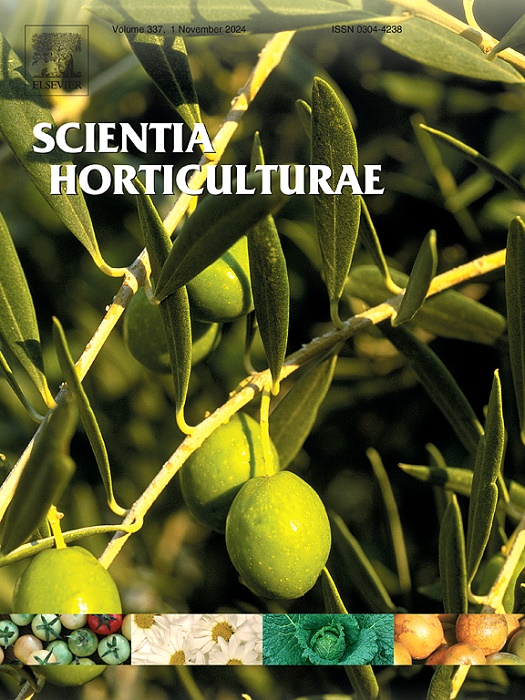Metabolic profiles of volatile organic compounds in cloudy grape juices from different varieties using headspace solid-phase microextraction and gas chromatography-mass spectrometry
IF 4.2
2区 农林科学
Q1 HORTICULTURE
引用次数: 0
Abstract
The objective of this investigation is to analyze the metabolic profiles of volatile organic compounds (VOCs) in cloudy grape juices from different grape varieties to evaluate their organoleptic characteristics and examine consumer preferences. This research is significant as it contributes to the growing trend of exploring new grape varieties that exhibit disease resistance and distinctive pigmentation, offering potential alternatives to conventional commercial grape types for premium juice production. The study was conducted from March to November 2023 in Al-Qassim, Saudi Arabia, on 12 hectares of grape area. The following grape varieties were examined: Cabernet Sauvignon, Chardonnay, Muscat, Blanc Du Bois, Solaris, Crimson Seedless, and Black Corinth. The juice was produced using a process that included sorting, crushing, pressing, and pasteurization at 85 °C for 30 s. Volatile organic compounds (VOCs) were extracted using solid-phase microextraction (HS-SPME), and their chemical profiles were analyzed through gas chromatography coupled with mass spectrometry (HR-TOF-MS). Organoleptic analysis involved a panel of tasters to investigate the correlation between the VOC chemical profiles and the characteristics of the juices. The results show that the cloudy juices derived from Black Corinth and Solaris varieties exhibit unique VOC profiles that significantly differ from those of traditional varieties. Notably, the content of linalool in Black Corinth juice was 14.2 µg/L, considerably higher than the 4.1 µg/L observed in Chardonnay juice. Consumer surveys indicated that approximately 45 % of respondents preferred Black Corinth juice, suggesting the commercial appeal and potential viability of this variety. Based on the collected data, it can be inferred that new grape varieties with unique VOC profiles have the potential to compete with traditional varieties by offering high-quality, nutrient-dense juice products. These findings can guide the development of innovative, functional beverages that meet modern consumer preferences.
顶空固相微萃取-气相色谱-质谱法测定不同品种混浊葡萄汁中挥发性有机化合物的代谢谱
本研究的目的是分析不同葡萄品种混浊葡萄汁中挥发性有机化合物(VOCs)的代谢特征,以评估其感官特征并检查消费者偏好。这项研究具有重要意义,因为它有助于探索具有抗病性和独特色素沉着的新葡萄品种,为优质果汁生产提供传统商业葡萄类型的潜在替代品。该研究于2023年3月至11月在沙特阿拉伯的卡西姆的12公顷葡萄区进行。以下葡萄品种被检查:赤霞珠,霞多丽,麝香,白杜波依斯,索拉里斯,深红无籽和黑科林斯。果汁的生产过程包括分选、粉碎、压榨和85°C高温消毒30秒。采用固相微萃取法(HS-SPME)提取挥发性有机化合物(VOCs),采用气相色谱-质谱联用(HR-TOF-MS)分析挥发性有机化合物的化学特征。感官分析包括一组品尝者来调查挥发性有机化合物的化学特征和果汁特性之间的相关性。结果表明,黑科林斯和索拉里斯品种的混浊汁液表现出与传统品种明显不同的独特VOC特征。值得注意的是,黑科林斯汁的芳樟醇含量为14.2µg/L,明显高于霞多丽汁的4.1µg/L。消费者调查表明,大约45%的受访者更喜欢黑科林斯果汁,这表明该品种的商业吸引力和潜在的可行性。根据收集到的数据,可以推断,具有独特VOC特征的新葡萄品种具有提供高质量,营养丰富的果汁产品的潜力,可以与传统品种竞争。这些发现可以指导创新、功能性饮料的开发,以满足现代消费者的偏好。
本文章由计算机程序翻译,如有差异,请以英文原文为准。
求助全文
约1分钟内获得全文
求助全文
来源期刊

Scientia Horticulturae
农林科学-园艺
CiteScore
8.60
自引率
4.70%
发文量
796
审稿时长
47 days
期刊介绍:
Scientia Horticulturae is an international journal publishing research related to horticultural crops. Articles in the journal deal with open or protected production of vegetables, fruits, edible fungi and ornamentals under temperate, subtropical and tropical conditions. Papers in related areas (biochemistry, micropropagation, soil science, plant breeding, plant physiology, phytopathology, etc.) are considered, if they contain information of direct significance to horticulture. Papers on the technical aspects of horticulture (engineering, crop processing, storage, transport etc.) are accepted for publication only if they relate directly to the living product. In the case of plantation crops, those yielding a product that may be used fresh (e.g. tropical vegetables, citrus, bananas, and other fruits) will be considered, while those papers describing the processing of the product (e.g. rubber, tobacco, and quinine) will not. The scope of the journal includes all horticultural crops but does not include speciality crops such as, medicinal crops or forestry crops, such as bamboo. Basic molecular studies without any direct application in horticulture will not be considered for this journal.
 求助内容:
求助内容: 应助结果提醒方式:
应助结果提醒方式:


